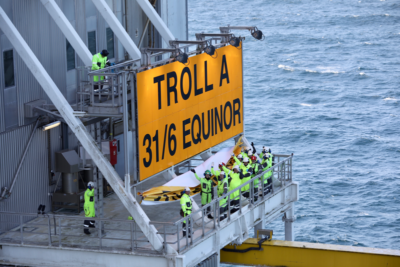The price of Norway’s crude oil was up 10 percent Monday morning, and even higher than that earlier, as markets opening for the week reacted to a drone bombing of Saudi Arabia’s huge oil processing plant over the weekend. High oil prices pump much more money into Norway’s economy, but analysts weren’t exactly celebrating.

“We’ve been fearing this for many years,” Thina Saltvedt, an energy analyst at Nordea Markets in Oslo, told newspaper Aftenposten. “When something happens to Saudi Arabia’s oil production it involves such huge volumes.” Even though Norway’s oil companies and the state treasury benefit from higher oil prices, Saltvedt notes that consumers will face higher prices for gasoline and diesel and, eventually, other goods that need to be transported.
The price of Norway’s own North Sea crude, which traded at around USD 60 a barrel on Friday, shot up to USD 66.21 at 9am Monday when the Oslo Stock Exchange opened. Oil-related share prices immediately surged as well, with state oil company Equinor opening up 4.8 percent, Aker BP up 5.6 percent and DNO up 4.3 percent. The Oslo Stock Exchange’s key index was up nearly 1 percent at the open.
“The Oslo Stock Exchange is among the most energy-heavy exchanges in the world,” noted analyst Ingvild Borgen Gjerde of DNB Markets. At the same time, she noted, it’s vulnerable to the moods of the international market. If the weekend bombing in Saudi Arabia puts a damper on the market, the Oslo Børs can be influenced negatively.
‘Shock effect’
Some analysts think oil prices will gush to USD 70 or more after the drone attack claimed by a Shia Muslim Houthi militia in Yemen, which Saudi Arabia has bombed for years, on the world’s largest oil facility. It produces more than 5 percent of the world’s oil production, around half of which ceased immediately.
“There’s also a shock effect because this came so suddenly,” Saltvedt told Aftenposten. “At the same time there are concerns that instability in the area will get worse. The Middle East is still the world’s most important oil-producing region, and the risk shows up in the oil price.”
Oddvar Bjørgan, oil analyst at securities firm Carnegie in Oslo, told Aftenposten that if it “takes some time” for the Saudis to restore oil production, oil prices can rise by around USD 10 from Friday’s closing levels. If production is halted for a long time, prices can jump to as much as USD 100 per barrel.
Despite all the extra money flowing into Norway’s dominant oil industry and state coffers, Bjørgan also noted that high oil prices will dampen demand. They can also hurt world economic growth and add to the uncertainty already caused by the US’ trade war with China.
“This incident (the bombing) reminds us that we must develop other energy sources as quickly as possible,” Bjørgan said, given the risk of being overly dependent on a single oil-producing nation.
newsinenglish.no/Nina Berglund

